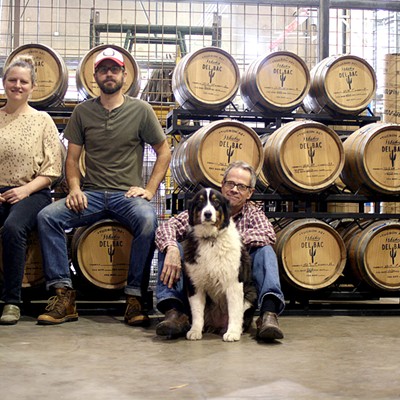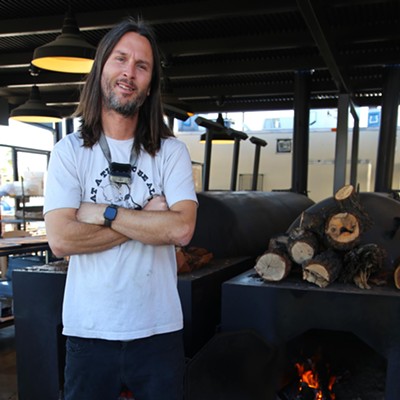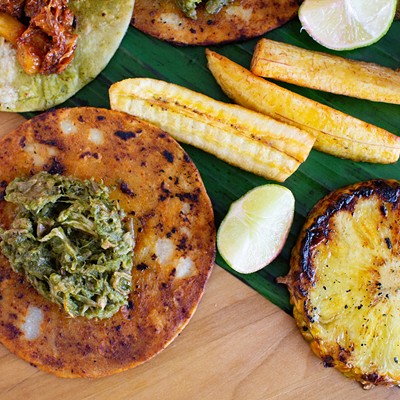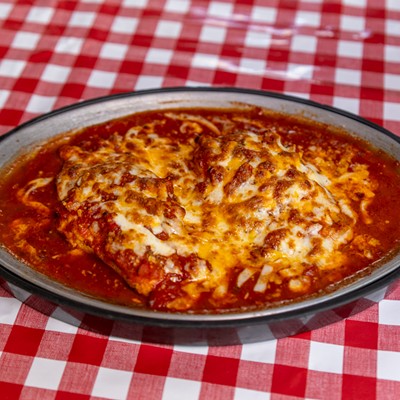While Tucson is already home to a burgeoning craft beer scene, whiskey fans have a new, locally distilled libation to look forward to—and by all accounts it's a good one.
Hamilton Distillery is pulling Tucson into microdistilling with Whiskey Del Bac, a take on single-malt whiskey with a decidedly Sonoran twist drawn from his years of furniture making, of all things.
When asked how Hamilton Distillery came about, Stephen Paul explained with a laugh, "My wife and I drink scotch." Traditional scotch, to anyone who's tasted it, has one overarching characteristic: a deep, earthy smokiness that is the result of the traditional method of drying grain over a peat-fueled fire.
Now would be a good time to note that Paul is not just a fan of whiskey: He's also the owner of Arroyo Design, which has specialized in building mesquite furniture for more than 25 years, making him something of an expert on the wood, using it in both his business and his personal life—often for mesquite-fueled cookouts at his house.
"We barbecue with mesquite, and I'd always joke around and say, 'Those are my profits going up in smoke,'" Paul said. "One evening, my wife goes, 'Why couldn't we malt barley over a mesquite fire, since it lends such a great flavor to foods?'"
The idea took off from there.
For the last year and a half, Paul has operated Hamilton Distillers out of a small warehouse at 209 N. Hoff Ave., just off Fourth Avenue. Look for the small mesquite smoker just outside the building. Along one wall of the small distillery is the trough where Paul keeps his barley seed. Another features Paul's "library," which is filled with whiskeys he's purchased or been given as gifts that he uses for inspiration. One corner is packed with pallets of bottles that Hamilton's products will one day fill; another is what Paul calls his "cooling room," a space where finished whiskeys sit in large, glass jugs next to a wall-unit air conditioner.
The centerpieces of the room, however, are the rows of small, 15-gallon white oak barrels that hold aging whiskey—barrels that were chosen for the wood they're made from as much as for the staves they're composed of. Their tight design allows for less evaporation loss, a tremendous concern for Paul given Tucson's dry climate. The small barrels were chosen specifically for their aging properties, Paul said. "Smaller barrels have a greater surface-to-volume ratio, allowing the product to age faster," he said, which is a fairly big deal when trying to create enough product for a proper launch.
Stepping into the other room, visitors see a 40-gallon still that is the center of the distilling operation, as well as stacks of measurement tools. A look around the room reveals the byproducts of the distillation process; posters that remind Paul that bottle design is just as important as taste to consumers; and a certificate indicating that at least some of his distillation knowledge was taught to him, that he did not simply stumble across it.
The journey from hobby to business began in 2006 when Paul bought a 5-gallon kettle still and began working on his technique at home: learning the right time in the barley seed's germination cycle to begin drying it; brewing the whiskey; distillation; cutting the "heads" and "tails" (the byproducts of distillation that taste awful and/or will make you go blind) from the drinkable parts; and the aging process.
Paul even hired a sensory consultant to assist him in production—an expert in smelling and tasting whose expertise helped refine Paul's process. "I'd send her distillate right out of the still, and she'd rip it apart, basically," Paul said, noting that she would tell him when there was too much of the heads or tails still in the product. "On reflection now, I can detect that," he said.
Now, Paul seems to have developed a good routine (though there was at least one stumble, in the form of mesquite-wood barrels for aging the whiskey. The experiment "was not good at all ... it was horrible," Paul said; those small barrels now rest on his shelves, waiting possible future use). He began by working on an unsmoked single-malt whiskey that's become comparable to most craft whiskeys available—it's his "control," the spirit he worked on before moving onto mesquite-smoked varieties, thinking "let's not deal with mesquite at first, let's just learn how to make a good single-malt whiskey."
His mesquite-smoked whiskey, as one might expect, is unlike anything else on the market today — smoky, herbal and very drinkable. It's all but guaranteed to draw the attention of those who consider themselves whiskey aficionados.
But the product that seems to be turning the most heads is the unaged, mesquite-smoked whiskey—what some would call "white dog" or "raw" whiskey. It's a variety that counts many of Tucson's most talented drink mixers among its fans, as Paul learned during a private tasting given for members of the local chapter of the United States Bartenders' Guild. Their comments ranged from noting the whiskey's uniqueness ("Unlike any white I've ever had") to praising it outright ("a unique whiskey that embodies the great American Southwest").
Karl Goranowski, the beverage manager at downtown's Saint House Rum Bar, was among the members of the Tucson chapter to sample Hamilton's products. He offered one piece of advice for Paul: "Whatever it is you're doing, keep doing that."
"For a very small distillery (like Hamilton), that's what he has to focus on: the quality," Goranowski said. "Because he's on such a small scale, the consistency isn't as important as the quality—if his 2012 tastes markedly different from his 2013, but they both taste very good, I think that could be a really, really cool thing. Because the scale he's working on is so small, the differences ... may be what helps him stand out in the marketplace."
That marketplace appears to be the world of on-premise sales—bars and restaurants—for the time being. According to Paul, the distillery has already had talks with local distributors and has drawn interest from establishments all over Tucson. He said retail sales will come later, noting that "We don't want to create a demand that we can't supply."
Given the praise that Hamilton Distillery's Whiskey Del Bac has earned through early tastings, that sort of demand is a real possibility.










